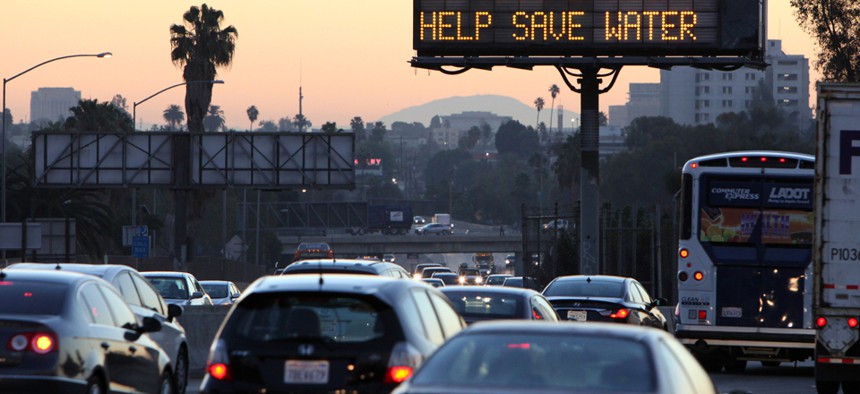Connecting state and local government leaders
Economists say that the resource is currently too cheap. Will dry conditions finally help give the issue the political clout necessary to charge more?
There's a classic economic paradox about the price of water and value, and it comes from Adam Smith: Why do diamonds cost more than water? The comparison is meant to demonstrate how pricing works—that even though water is essential for human survival, our economy puts prices on things based on scarcity and value (and marginal utility ). As long as water remained abundant, the cheapness of water would likely not change. But the price of water has come into serious question as drought-struck California and Western states debate whether water is too cheap .
"We Americans are spoiled, we wake up in the morning and we turn on the tap and out comes as much water as we want for less than we pay for cellphone service or for cable television. So we take water for granted," says Robert Glennon, a water expert at Arizona University and the author of Unquenchable: America’s Water Crisis and What To Do About It . "We all pay a ridiculous amount of money for the water."
How "ridiculous" exactly? Currently, water pricing is largely based on delivery—that is, the cost to get water from the source to the consumer. In some parts of the country, consumers are not even paying the cost of delivery while in other places, such as Sacramento, some houses don't even have water meters. "None of us are paying for the water itself...economists talk about the marginal cost of water, and very few places in the country are people even paying for the marginal cost," says Glennon.
Economists argue that without real prices and measurements that would determine cost, there's no incentive to conserve consumption. But these prices and systems were set in a time when water shortage wasn't a huge issue. Robert Carson , an economics professor who specializes in natural resources at University of California San Diego, says that caps on water prices were set in part so municipalities could not abuse the utility for profit.
"California law requires that a water utility can only collect money to cover its costs," says Carson. "While preventing cities from using water utilities to extract lots of extra revenue, it prevents a water district from using a higher price to reduce demand."
Since drinking water is a human right, experts all agree that the base amount a person needs to survive, about 15 gallons a day, should be subsidized. Carson says that increasing block rates effectively deals with this issue. In the past, water in urban districts was priced at a decreasing rate since delivery costs fell as the quantity of water delivered increased. But now for the sake of conservation, the first block of water—the amount necessary for survival—is subsidized. Carson says that over 70 percent of water use in California urban areas is outdoors. It's the issue of how to price water for swimming pools, lawns, and agriculture that's tricky and politically thorny.
The drought's cost to agriculture has been estimated to be as high as $1.5 billion . According to a report by The Hamilton Project , agriculture accounts for over 80 percent of water consumption in the American West. Though water for farming does not require treatment the way water for cities does, farmers still pay significantly less. Glennon estimates that some agriculture water bills can be as low as a few pennies for thousands of gallons. "Often times, the people in urban areas are paying 10 times the price per unit of water," says Carson.
Because agriculture saps up such a significant amount of the water supply, full-blown panic of a drinking-water shortage is in some sense overblown. Glennon estimates that a 4 percent reduction in agriculture and livestock water consumption would translate into a 50 percent increase in water available for all residential, commercial, and industrial users. His proposed solution to the drought is a water market where the resource could be easily traded. For example, a dry-year option so some farmers can have a revenue stream while forgoing growing their crop during a dry year so water can be diverted to other farmers or users with more urgent need.
Carson also believes that the most straightforward way to fix California's urban water problem is to change laws in order to permit water transfer between agriculture water and urban areas. He also recommends that urban districts should be allowed to raise prices before droughts occur to maintain supply. Currently, the water shortage in California is so dire that residents are turning to energy-intensive desalination plants for supply .
"Desalination has become a more reasonable upper bound on cost as the technology has become more efficient and natural gas prices have fallen with increased use of fracking," says Carson.
The environmental concerns over desalination , the process of converting ocean water into fresh water, are that the ecological price is high. Besides, the traditional ways of solving water-shortage problems, diverting water from rivers and pumping groundwater to increase supply, have their own environmental consequences . As climate change reduces river flow , water use in cities should not be discounted just because it is relatively small in volume. The impact is huge: For example, the Colorado river serves 30 million people in seven states .
"From an economist’s stand point, modern urban water shortages are almost always self-inflicted wounds," says Carson.
As water becomes more scarce, the hope is that the political difficulties in the allocation of water will decrease, and that using prices to reduce consumption will become more acceptable. In these dry times, water shouldn't be free.



